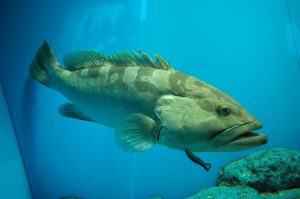Exploitation and Cooperation by Cleaner Wrasse
By Laura Vander Meiden, RJD Intern
The relationship between cleaner wrasse and reef fish has long been one of the textbook examples of mutualism, a partnership in which both individuals benefit. In this relationship, the cleaner wrasses set up “cleaning stations” where they eat parasites and dead skin cells off of willing reef fish. The reef fish benefit through the removal of those parasites, while the wrasses gain a food source. However, the cleaner wrasses’ preferred food source is actually a type of mucus given off by the reef fish. Because of this, the cleaner wrasses sometimes deviate from mutualistic parasite removal by eating mucus given off by the client (Grutter et al 2003). This cheat disrupts the balance of the symbiotic interaction making participation detrimental to the reef fish that need the mucus for protection from bacteria and parasites. If this cheating behavior were to become the norm for cleaning wrasses, the reef fish would eventually stop participating because the partnership is no longer beneficial for them. Fortunately, both cleaner wrasse and reef fish have developed behaviors that limit the detrimental effects of cheating and keep the mutualistic relationship stable.
Non-predatory reef fish employ several different behaviors to keep the cleaner wrasse from sneaking bites of mucus. If there are multiple cleaner wrasse in the area, a fish who has had mucus stolen will immediately leave and visit another wrasse’s cleaning station. If there is only one wrasse in the area, the exploited fish will end the cleaning session and aggressively chase the wrasse. Both of these behaviors temporarily reduce the wrasse’s ability to feed by the termination of the session, and in the case of chasing behavior, are energetically intensive for the wrasse. Bshary et al (2005) has provided evidence that these two behaviors actually teach the wrasse to feed against their food preferences, limiting their mucus stealing. These two behaviors are called alternative control behaviors; they are termed such because non-predatory reef fish, the ones targeted by exploitation, have no option to cheat in this partnership, so instead they work to affect the outcome by these alternative means. Predatory reef fish on the other hand can reciprocate cheating behavior by eating the cleaner wrasse, it is likely for this reason that cleaner wrasse have not been observed to cheat in interaction with predatory reef fish (Bshary 2005).
These alternative control behaviors do not completely eradicate the cheating behaviors of cleaner wrasse. Instead, the cleaners have the ability to switch back and forth between mutualistic and parasitic behavior, based on the circumstances (Gingins 2013). The experimental conditions that were found to affect the cleaner’s decision to exploit were the level of temptation to cheat and the extent to which the partner employed alternative control behaviors. A higher level of temptation combined with a lack of controlling behaviors led to the highest level of exploitation while low temptation no matter the level of control behaviors utilized led to increased mutualism (Gingins 2013). Furthermore this ability to distinguish between different conditions was unique to cleaner wrasses. When a pinstripe wrasse, a non-cleaning wrasse species, was tested in the same situation it failed to adjust its behavior to the conditions(Gingins 2013). This is likely due to the fact that non-cleaning species have no reason to have evolved the cognitive capacity to decide when or when not to cheat.
The back and forth between cleaners and reef fish may seem a bit excessive for what is supposed to be a mutually beneficial relationship. However, one has to realize that both the cleaner wrasse and the reef fish are focused on their own best interests. When these interests coincide with one another, the two are able to interact to the mutual benefit of all involved. When these interests do not coincide, such as when a cleaner wrasse attempts to cheat and eat mucus, the cooperation between the two will either disappear or strategies such as the reef fishes’ alternative control behaviors will develop. These behaviors decrease the benefits of the wrasse’s cheating behavior until it is in its own best interest to return to eating only ectoparasites and dead skin cells. Ultimately, the evolution of alternative control behaviors in this system has allowed for the continuance of this mutualistic behavior.
Works Cited





Leave a Reply
Want to join the discussion?Feel free to contribute!